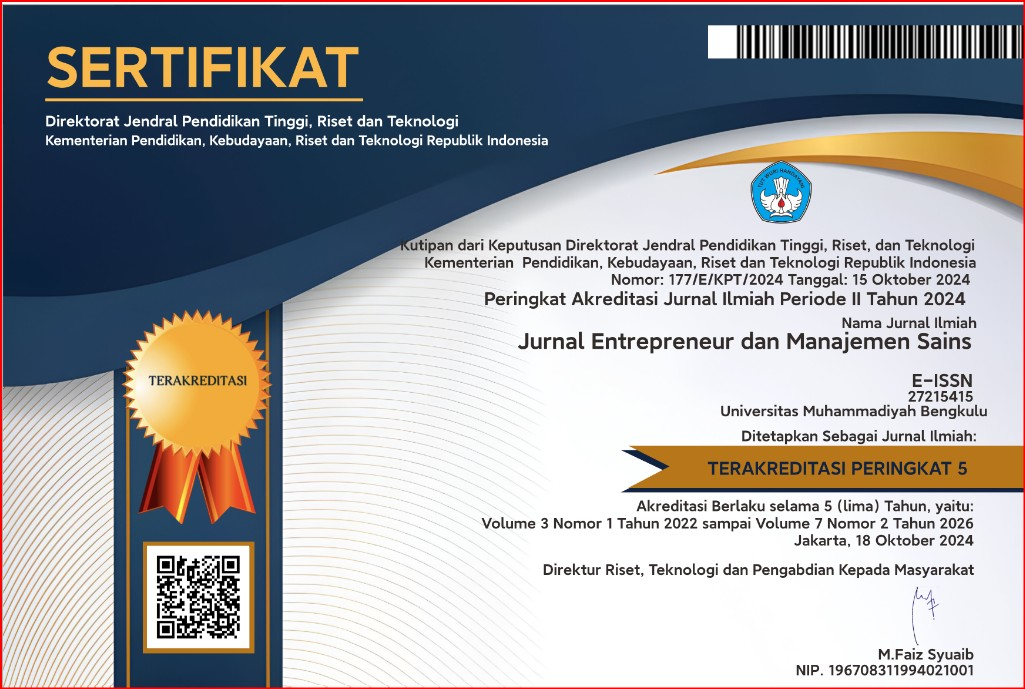PENGARUH SIKAP DAN DISIPLIN KERJA TERHADAP PRESTASI KERJA KARYAWAN PT. PRIORITAS KOTA BENGKULU
DOI:
https://doi.org/10.36085/jems.v1i2.923Abstract
This study aimed to determine The Effect of Attitude and Dicipline toward Employees’ Achievement of PT. Prioritas of Bengkulu City. The number of samples were used as many as 90 Respondents by using purposive sampling techniques. The data were analyzed by using Multiple Linear Regression Analysis Techniques, Determination Coefficient Analysis (R2), and Partial Test (t Test), Simultaneous Test (Test f).The results of this study indicate that partially significant attitudes influence work performance with a value of α = 0.00 and work discipline significantly influence work performance with a value of α = 0.11. While f Attitude Test (X1) and Discipline (X2) have a significant influence toward employees’ performance (Y) at PT. Prioritas Bengkulu City overall significant level of α = 0.000. It has a regression equation Y = 5.380 0.490 (X1) 0.317 (X2),with the coefficient of determination of the Adjusted R Square value is 0.423. The coefficient of determination has the meaning that together attitudes and discipline contribute in influencing work performance of employees of PT. Prioritas Bengkulu City. While the most dominant factor with the greatest regression coefficient value is a variable with a value = 0.490.
Keywords: Attitude, Discipline and Work Performance of Employees.
References
Adi Wahyu, Nugroho, dan Budi Sudaryanto. (2013). Pengaruh Kinerja Layanan Kepercayaan dan Kepuasan Konsumen Terhadap Loyalitas Konsumen Dalam Menggunakan Jasa Pengiriman Barang. Jurnal Of Manajemen. Vol 2. No 3.
Anjani, R. (2019). Tata Kelola Adminitrasi Keuangan, Dan Pembangunan Desa Tepi Laut Kabupaten Bengkulu Utara. Jurnal Pengabdian Masyarakat Bumi Raflesia, 2 (2).
Asmawi, M. (2017). The effect of compensation, empowerment, and job satisfaction on employee loyalty. International Journal of Scientific Research and Management, 5(12), 7590-7599.
Ahmadi, Abu. (2007). Psikologi Sosial. Jakarta: Rinakel Cipta.
Anoraga, Panji. (2003). Psikologi Kepemimpinan. Jakarta : Rinakel Cipta.
As’ad, Moh. (2000). Psikologi industri. seri ilmu sumber daya manusia. Jakarta : BPFE UI.
Aswar, Saifudin. (2005). Sikap Manusia : Teori dan Pengukurannya. Yogyakarta : Pustaka Belajar.
Aswar, Saifudin. (2013). Sikap Manusia : Teori dan Pengukurannya. Yogyakarta : Pustaka Belajar.
B. Siswanto Sastrohadiwiryo. (2003). Manajemen Tenaga Kerja Indonesia. Edisi dua : Jakarta. PT. Bumi Aksara.
Fuad Mas’ud. (2004). Survai Diagnosis Organisasional. Badan Penerbit Universitas Diponegoro.
Finthariasari, M. (2019). Variabel Employee Engagement, Organizational Commitment, Job Embededdness, OCB, & Turnover Intention Pada Karyawan Perbankan Konvensional Kota Bengkulu. Universitas Bengkulu: Disertasi.
Hasibuan, Melayu. (2001). Manajemen Sumber Daya Manusia. Jakarta : PT Bmi Aksara.
Martoyo, Susilo. (2000). Manajemen Sumber Daya Manusia. Jogjakarta : PT. BPFEE- Jogjakarta.
Musanef. (2001). Manajemen Kepegawaian di Indonesia. Bandung. Madar Maju.
Onsardi, O. (2018). Loyalitas Karyawan pada Universitas Swasta di Kota Bengkulu. COSTING: Journal of Economic, Bussines and Accounting, 2(1), 1-13.
Onsardi, O. (2019). Implementasi Manajemen Kinerja Di Universitas Muhammadiyah Bengkulu (No. kzyfx). Center for Open Science.
Siagian, S. P. (2003). Teori dan Praktek Kepemimpinan. Cetakan Kelima : Jakarta. Renika Cipta.
Siswanto, Bejo. (2001). Managemen Tenaga Kerja. Sinar Bandung.
Sudaryono. (2014). Metode Penelitian Bisnis. Bandung : Cetakan Kedua, Alfabeta.







